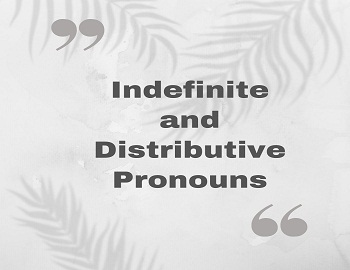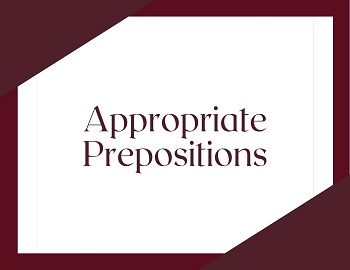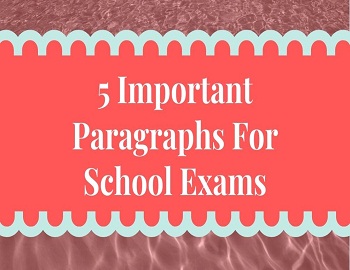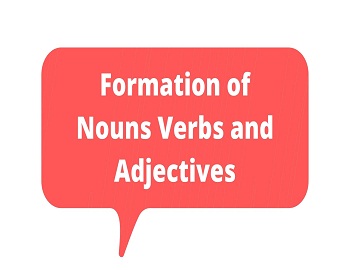Table of Contents
Conversion of Direct Narration into Indirect Narration:
In Direct Narration (Speech) we have the exact words of the speaker, as, Mohan said, “I am reading in seventh class”.
Here “I am reading in seventh class” are the exact words of the speaker. The exact words reported are put within inverted commas (” “) and separated from the reporting verb (usually said) by means of a comma (,).
When a sentence changes from Direct Speech into Indirect Speech, the comma (‘) that separates the words of the speaker as well as the inverted commas (“…..”) are removed. Verbs usually change their tenses. Pronouns and Possessive Adjectives of 1st Person and 2nd Person are usually changed. Pronouns of 1st person is changed into the person of the subject of the reporting verb and those of 2nd person are changed into the person of the Object of the reporting Verb but, their case remains the same; as,
| He said to me, “I will help you.” (Direct speech) He told me that he would help me. (Indirect speech) |
It indicates that ‘I‘, the pronoun of the 1st person changes into the pronoun of the 3rd person, the person of the subject of the reporting verb ‘told‘ and ‘you‘ the pronoun of the 2nd person changes into the person of the object of the reporting verb but the case remains the same. Pronouns of 3rd person remain unchanged; as,
| You said, “We helped them in every venture.” You said that you had helped them in every venture. |
Again the tense of the verb of the Reported Speech also changes into the corresponding Past Tense.
Note 1: If the tense of the Reporting Verb is in Present or Future Tense, no change in the tense of the verb of the Reported speech is affected; as,
| (1) Shilpa says, “I will never shun work.” Shilpa says that she shall never shun work. (2) Ritu will say, “I loved my father; I loved my mother.” Ritu will say that she loved her father and she loved her mother. (3) Sonu says, “I have obeyed my parents by carrying out every wish of theirs.” Sonu says that he has obeyed his parents by carrying out every wish of theirs. |
Note 2: If the tense of the Reporting Verb is in the Past, the tense of the verb of the Reported Speech changes into the corresponding Past; as,
| (1) They said to us, “We are busy serving you.” They told us that they were busy serving us. (2) The girl said to you, “I have made tea for you.” The girl told you that she had made tea for you. (3) The man said to me, “I am waiting for you.” The man told me that he was waiting for me. (4) The peon said, “I will always ring the bell at the appointed time.” The peon said that he would always ring the bell at the appointed time. (5) The servants said to his master, “I can endanger my own life for you if need be.” The servants told his master that he could endanger his own life for him if the need was. |
Note 3: If the Reported Speech of the Direct Speech contains such words as shown nearness they are changed into the words showing distance; as,
| (1) Sorav said, “I am leaving for Mumbai today by Express Train.” Sorav said that he was leaving for Mumbai that day by Express Train. (2) The girl said, “I bought this doll yesterday.” The girl said that she had bought that doll the previous day. (3) The master said to his servant, “You shall have to attend to this job just now.” The master told his servant that he would have to attend to that job just then. |
To sum up all, we have to observe the following rules in changing the Direct Speech into Indirect Speech:
Rules for change of Personal Pronoun:
(1) In the Reported Speech pronouns of 1st person are changed into the person of the Subject of the Reporting Verb.
(2) Pronouns of the second person change into the person of the Object of the Reporting Verb. If the Reported Speech has no Object, the person of the 2nd Person is changed into the pronoun of the 3rd person.
(3) Pronouns of 3rd person remain unchanged.
Rules for the Change of Tense in the Reported Speech:
(1) If the Reporting Verb is in the Present or Future Tense, the tense of the verb in the Reported Speech does not undergo any change.
(2) If the Reporting Verb is in the Past Tense, the Present Tense of the verb in the Reported Speech is changed into the corresponding Past Tense; as,
- Present Indefinite is changed into Past Indefinite.
- Present Continuous is changed into Past Continuous.
- Present Perfect is changed into Past Perfect.
- Present Perfect Continuous is changed into Past Perfect Continuous.
- Past Indefinite is changed into Past Perfect.
- Past Continuous is changed into Past Perfect Continuous.
Note: Past Perfect and Past Perfect Continuous Tenses remain unchanged.
(3) If the Reported Speech expresses a Universal Truth, a Custom, a Proverbial Saying or a Habitual fact, the tense of the verb in the Reported Speech is not changed.
Rule for Change of Words Denoting Time and Space:
- Now is changed into then.
- This is changed into that.
- These is changed into those.
- Here is changed into there.
- Ago is changed into before.
- Thus is changed into so.
- Come is changed into go.
- Today is changed into that day.
- Tonight is changed into that night.
- Tomorrow is changed into the next day or the following day.
- Yesterday is changed into the previous day or the day before.
- Last night is changed into previous night.
- Next day is changed into the following day.
- Last week is changed into the previous week.
- Next week is changed into the following week.
Assertive Sentences:
While converting the Direct Speech into the Indirect Speech, heed to the following:
(1) Change the Reporting Verb said into such word as told, replied, answered, remarked or informed if it is followed by an object, or else affect no change.
(2) Remove the Inverted Commas and use the connecting word that to connect the Reported Speech with the Reporting Verb.
(3) Nouns in the Vocative Case in the Reported Speech are made Object of the Reporting Verb.
| Direct | Indirect |
|---|---|
| He says to me, “I am at your disposal.” | He tells me that he is at my disposal. |
| You will say, “I have done my home task.” | You will say that you have done your home task. |
| I said to him, “I will help you tomorrow.” | I told him that I would help him the next day. |
| Ashoka said, “Honesty is the best policy.” | Ashoka said that honesty is the best policy. |
| He said to me, “They played a friendly cricket match yesterday.” | He told me that they had played a friendly cricket match the previous day. |
| He said to her, “I was writing a letter when you knocked at our gate.” | He told her that he had been writing a letter when she had knocked at their gate. |
| You said, “I visited the Taj yesterday.” | You said that you had visited the Taj the previous day. |
| The saint said to the people, “We should pray to God for His blessings.” | The saint exhorted the people that they should pray to God for His blessings. |
Interrogative Sentences:
While changing an Interrogative Sentence from the Direct Speech into Indirect Speech, observe the following rules:
Rule 1: Change the Reporting Verb into ask, inquire, enquire, demand, etc.
Note: Inquire, enquire and demand, should be followed by the preposition of before a personal object.
Rule 2: The Interrogative form of the Reported Speech is changed into Assertive form and the Interrogative sign is removed.
Rule 3: The usual rules of Change of Tense, the Person of Personal Pronouns and words denoting nearness as discussed earlier must be observed.
Rule 4: The inverted commas are removed and a word other than the conjunction that is used after Reporting Verb, according to the rules given below:
- When the question in the Direct Speech begins with a finite verb including an Auxiliary Verb (is, are, am, was, were, will, shall, do, did, dies, can, etc.), the Conjunction ‘whether‘ or ‘if‘ is used to introduce the Indirect Speech; as,
| Direct: He said to me, “Is this your book?” Indirect: He asked me if (whether) that was my book. Direct: They said to us, “Has the police rounded up any new terrorists now?” Indirect: They inquired of us if (whether) the police had rounded up any new terrorists then. |
- If the question in the Direct Speech begins with an Interrogative Pronoun (who, what, which, whom, whose, etc.), or with an Interrogative Adverb (when, where, why, etc.), the same Pronoun or Adverb is used to introduce the Indirect Speech; as,
| Direct: She said to you, “What is your name? Where do you live?” Indirect: She asked you what your name was and where you lived. Direct: Rani said to me, “Why are you in such a hurry?” Indirect: Rani inquired of me (or asked me) why I was in such a hurry. |
A few more solved examples:
| Direct | Indirect |
|---|---|
| My friend said to me, “Will you lend me your bicycle for a couple of days?” | My friend asked me if I would lend him my bicycle for a couple of days. |
| I said to him, “Why is there such a noise? Has anybody expired?” | I asked him why there was such a noise and if anybody had expired. |
| You said to her, “Did you ever help me?” | You inquired of her if she ever had helped you. |
| Bina said to the beggar, “Why do you beg from door to door? Are you not ashamed of it?” | Bina inquired of the beggar why he begged from door to door and if he was not ashamed of it. |
| My father said to me, “How did you dare spoil the show? Didn’t you know it shall annoy me?” | My father inquired of me how I had dared to spoil the show and if I had not known that it would annoy him. |
| She said to him, “Will you care to listen to my advice?” | She asked him if he would care to listen to her advice. |
| I said to her, “When will you pay the next visit?” | I asked her when she would pay the next visit. |
| The boy said to teacher, “May I come in, sir?” | The boy respectfully asked the teacher if he might go in. |
Imperative Sentences:
While converting Imperative Sentences from the Direct Speech into Indirect Speech observe the following rules:
Rule 1: Change the Reporting Verb ‘said‘ into some Verb expressing Command, Advice or Request (e.g. ordered, advised, requested, commanded, entreated, forbade, urged, etc.)
Rule 2: Change the Imperative Mood into the Infinite Mood by putting ‘to‘ before the verb.
Rule 3: No Conjunction is to be used to introduce the Reported Speech.
Rule 4: Observe the usual rules of change of person or nearness in time and distance.
A Few Solved Examples:
| Direct | Indirect |
|---|---|
| The Captain said, “March forward, my men and take the enemy by surprise.” | The Captain ordered (Commanded) his men to march forward and to take the enemy by surprise. |
| The doctor said to the patient, “Take these pills and you shall recover within a few days.” | The doctor advised the patient to take those pills and he would recover within a few days. |
| I said to him, “Please lend me your scooter for a few days. My scooter needs repairs and overhauling.” | I requested (entreated) him to lend me his scooter for a few days as my scooter needed repairs and overhauling. |
| The teacher said to a boy, “Get out of the class.” | The teacher ordered a boy to get out of the class. |
| My friend said to me, “Do not disturb me in my studies.” | My friend forbade me to disturb him in his studies. |
| The teacher said to Ramesh, “Do not make a noise.” | The teacher ordered Ramesh not to make a noise. or The teacher forbade Ramesh to make a noise. |
| He said to me, “Do a few favours to me.” | He urged me to do a few favours to him. |
Note: Change please of Direct Speech into requested of Indirect Speech.
Sentences Involving ‘Let’:
Rule 1: If let expresses proposal, the Reporting Verb is changed into ‘proposed‘ or ‘suggested‘ and let is replaced by should; as,
| Direct: My friend said to me, “Let us play some game.” Indirect: My friend proposed (suggested) me that we should play some game. |
Rule 2: If let expresses permission, it is changed into ‘might be allowed‘ or simply into ‘to let‘; as,
| Direct: He said to you, “Let me go home now.” Indirect: He requested you to let him go home then. Direct: The boy said to the teacher, “Let me come in.” Indirect: The boy requested the teacher that he might be allowed to go in. |
Rule 3: If let denotes a condition or a supposition, it is changed into might; as,
| Direct: The teacher said, “Let Mohan work ever so hard, he stands no chance of success.” Indirect: The teacher said that Mohan might work ever so hard, he stood no chance of success. or The teacher said that Mohan stood no chance of success however hard he might work. |
Exclamatory Sentences:
While turning the exclamatory sentences from the Direct into the Indirect form of Narration, observe the following rules:
(1) Change the Reporting Verb ‘said‘ or ‘say‘ into such words as exclaimed or exclaim, wished or wish, prayed or pray according to the sense of the Reported Speech.
(2) Leave aside Interjections Alas!, Hurrah!, Ah!, Oh!, Bravo! etc. and express their sense by using word, words, phrase or phrases.
(3) Change the Exclamatory Form of the Reported Speech into Assertive Form.
(4) Omit the sign of exclamation (!) and use full stop (.) in its place in the Indirect form of speech.
(5) If the Exclamatory Sentence begins with words like How or What, omit them in the Indirect form of speech. Express their sense by using the words very, big, great, etc.
(6) In the Indirect Speech we say wished good morning, wished good afternoon, wished good evening, bade good-bye, bade farewell, bade good-night, etc.
(7) Complete the sentence in Indirect Speech if it is incomplete in the Direct Speech; as,
| Direct: The on-lookers said, “What an excellent hit !” Indirect: The on-lookers exclaimed that it was a very excellent hit. |
(8) Observe all the rules governing the change of Personal Pronouns, Tenses of Verbs and words showing nearness in time and distance.
Study the following Sentences:
| Direct | Indirect |
|---|---|
| The old lady said, “Alas ! I have lost my purse.” | The old lady exclaimed with sorrow that she had lost her purse. |
| “Hurrah!” said the boy, “I have won a prize”. | The boy exclaimed with joy that he had won a prize. |
| She said, “How sweet my elder sister sings !” | She exclaimed that her elder sister sang very sweet. |
| “What a funny idea !” said they. | They exclaimed that it was a very funny idea. |
| She said, “What a fine weather !” | She exclaimed that it was a very fine weather. |
| We cried out, “Bravo! An excellent hit, Monu !” | We applauded Monu saying that it was an excellent hit. |
| The old lady said, “Oh! I am undone.” | The old lady exclaimed that she was undone. |
| He said, “Goodbye, my friends! I shall be coming again in a few days.” | He bade goodbye to his friends and told them that he would be coming again in a few days. |
Note: We wish ‘good morning‘, ‘good evening‘, ‘good day‘. good night‘, etc. but bid ‘farewell‘, ‘goodbye‘, etc.
Optative Sentences:
An Optative Sentence denotes the wish or prayer of the speaker. While changing the Direct Speech into the Indirect Speech, observe the following rules:
Rules: (1) Change the Reporting Verb into ‘wished‘, ‘prayed‘ or ‘longed‘.
(2) Use connective ‘that‘ to introduce the Reported Speech.
(3) Change the Optative form of the sentence into Assertive.
Study the following Sentences:
| Direct | Indirect |
|---|---|
| The mother said, “May God be gracious to you, my son !” | The mother prayed that God might be gracious to her son. |
| People said, “Long Live our beloved Prime Minister !” | People prayed that their beloved Prime Minister may live long. |
| “O for a sip of brandy !” said the wounded soldier. | The wounded soldier earnestly longed for a sip of brandy. |
| “Would that I were a prince !” said the boy. | The boy wished that he had been a prince. |
| “May success fall in your lot !” said the mother to her son. | The mother wished that success might fall in the lot of her son. |
| “May you be prosperous and happy !” said the beggar to the boy. | The beggar prayed (wished) that the boy might be prosperous and happy. |
A Few Typical Examples:
| Direct | Indirect |
|---|---|
| I said, “Yes, I am at fault.” | I confessed that I was at fault. |
| “No, I cannot help you with money,” said my friend. | My friend refused to help me with money. |
| He said, “No, I have not broken the window pane.” | He denied saying that he had not broken the window pane. |
| She said, “Yes, I broke the windowpane.” | She admitted that she had broken the windowpane. |
| The speaker said, “Ladies and Gentlemen, I shall draw out the true and clear picture of political condition of the country.” | Addressing the audience the speaker said that he would draw out the true and clear picture of political condition of the country. |
| I said to him, “Thank you.” | I thanked him. |
| The housewife said, “A thief !” “A thief!!” “Catch the thief !” | The housewife shouted (cried) aloud to the people to catch the thief. |
| Pooja said, “By heavens, I am innocent.” | Pooja swore by heavens that she was innocent. |
| He said to me, “Cheer up, my friend. Do not lose heart.” | Calling me his friend he encouraged me advising me not to lose heart. |
| I said, “I congratulate you, Pooja.” | I congratulated Pooja. |
| The policeman said, “You rogue, I have caught you.” | The policeman called him a rogue and said that he had caught him. |
| He said to me, “Rest assured, I will not desert you in your evil days.” | He assured me saying that he would not desert me in my evil days. |
| “Nonsense, you have spoiled the whole show,” said he to me. | He angrily told me that I had spoiled the whole show. |
| The farmer said to the fox, “You ruffian, I shall hang you.” | The farmer called the fox a ruffian and said that he would hang him. |
| “By God,” said I “I am innocent.” | I swore by God that I was innocent. |









Comments (No)